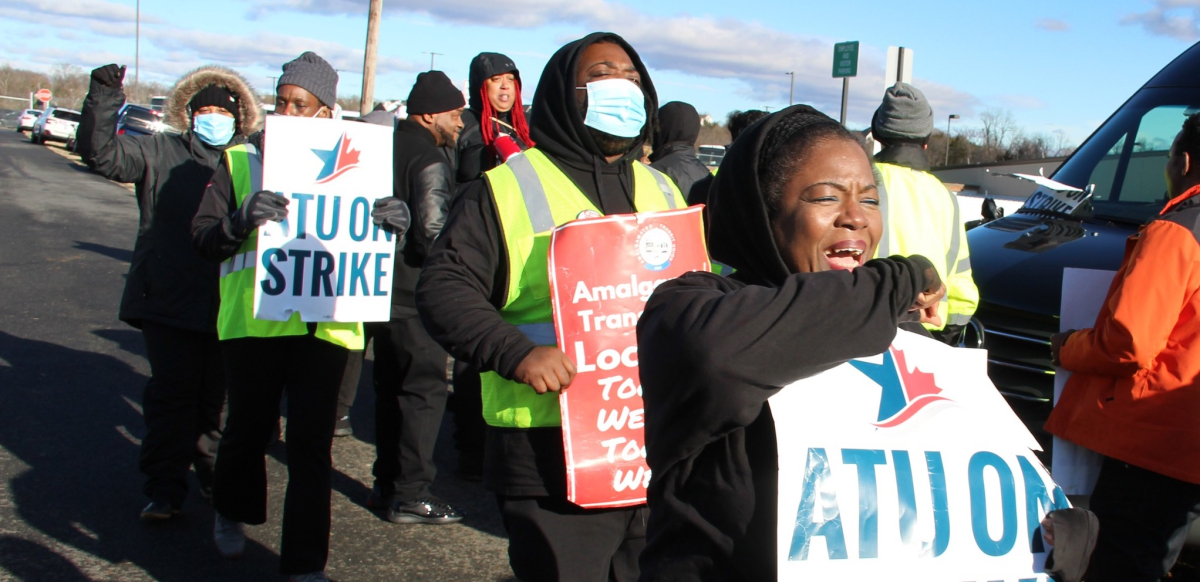Virginia Transit Strikers Fight Privatized Race to the Bottom

Transit workers in Loudoun County, Virginia, are out on strike challenging their private employer, Keolis. Photo: ATU.
Around 130 workers who operate, fix, and dispatch buses in Loudoun County, Virginia, went on strike Wednesday morning.
They’re up against Keolis, a French multinational and one of the largest private operators of public transit systems in the U.S. The company has challenged the union’s right to strike, its right to a contract, and even its existence.
The Loudoun County workers join a movement of bus operators, mechanics, dispatchers, and call center operators striking around greater Washington, D.C. It’s the eighth transit job action in the region in just over three years. Hundreds of strikers have faced down major private contractors—not only Keolis but also Transdev, MV Transportation, and RATP Dev.
For Amalgamated Transit Union Local 689, these fights are not just over bad behavior from this or that private operator, they’re about whether buses should be a public service or a source of private profit.
In 2019, 120 workers at the Cinder Bed Road garage in Virginia struck against Transdev for 84 days, in the first strike at a Washington Metro Area Transportation Authority bus garage in four decades. They penned an iconic strike anthem and pushed WMATA to bring its operations back in-house—a rare de-privatization win.
STRATEGIC UNDERBID
At the heart of this strike are low wages. Loudoun County is one of the most expensive places in the country. Keolis took over the contract to operate Loudoun County Transit bus service in 2021 from another multinational operator, Transdev. In that deal, the County also merged its paratransit operation into a single contract with Keolis. Paratransit serves passengers who can’t use fixed-route buses due to mobility issues.
The transit side of the operation had organized with ATU in 2017 in a 93 percent vote, and had ratified its first contract in early 2018. But the paratransit workers were non-union. And despite a successorship clause in the Transdev contract, Keolis convinced the National Labor Relations Board to hold a new election for the combined unit.
To the union, this was all part of a bigger plan. According to a statement from Local 689 President Raymond Jackson, “Keolis underbid this contract and thought they were going to profit off of underpaying these workers forever.”
The company was counting on undoing the gains that workers had so recently won—and if possible, doing away with the union altogether.
WON THEIR UNION…TWICE
Sandra Vigil has been a bus operator at Loudoun County Transit since 2015. In fact, Vigil was one of the workers who first reached out to the ATU about organizing.
She recalls the difference that first contract made: “Wages went from $15 to $19 per hour, and top pay went up to $31 per hour within four years. We had a 38-hour guarantee. Health insurance was pretty good—not the best, but people could get the care they needed. Our 401k had a 6 percent match. People were happy with the contract.”
The first contract was set to expire at the end of 2021. But by February of that year, things were already going downhill.

SUPPORT LABOR NOTES
BECOME A MONTHLY DONOR
Give $10 a month or more and get our "Fight the Boss, Build the Union" T-shirt.
Since Keolis maintained—and the NLRB agreed—that the new, merged company was a totally separate entity from the company that had unionized in 2017, workers were deemed to be at-will employees without contract protection. Some were let go.
The new election to rejoin the union was delayed for many months; it finally took place in March 2022. With 118 eligible voters, the vote was 71-2 for ATU.
ZERO RAISE AND ZERO HOURS
Then came bargaining. Keolis came after the gains that workers had won from Transdev.
The company proposed no pay increase for commuter bus operators; slashing the number of guaranteed hours from 38 to zero; cutting the 401k match from 6 percent to 1; jacking up health insurance costs; and using footage from driver-facing cameras to discipline bus operators for minor infractions.
Keolis has since petitioned the county for more funding. Having underbid the competitors, it says it just can’t pay what the workers were making previously. In response to that complaint, the union led an effort to win an extra $4 million from the county.
But according to Local 689 Recording Secretary Barry Wilson, “Once [Keolis] got the money, some went to the union members, but most went to management.”
On the second day of the strike, the union met with the company, who insisted the deal on the table was the “last, best, and final offer” and refused to set new bargaining dates.
Having unionized twice in five years, and already won one first contract, the workers voted to authorize a strike in November.
Other transit workers across the country have fought pitched battles with the same private operators in recent years. Teamsters Local 533 in Reno, Nevada, has struck Keolis multiple times over the past 18 months. Local president Gary Watson says Keolis has tried similar tactics in Nevada, and has continued to commit unfair labor practices even after agreeing to settlements; now the Teamsters and ATU are asking the National Labor Relations Board to rescind those settlements and take action against the company.
“They come in here and they bid these systems for low-dollar,” Watson says of Keolis. “They want to tire you out, and they’ll do that at whatever expense it takes. They think when they tire you out, they’re going to win, because you’ll just give up.”
Watson says if ATU strikers decide to come out to Reno to form a picket line at the Washoe County transit system, the Teamsters will honor it.
In Charlotte, North Carolina, 500 transit workers under another private operator, RATP Dev, have authorized a strike with SMART Local 1715.






